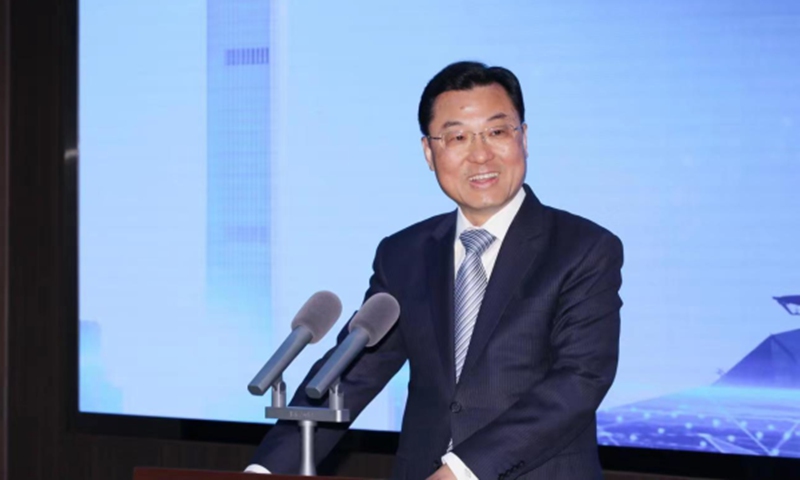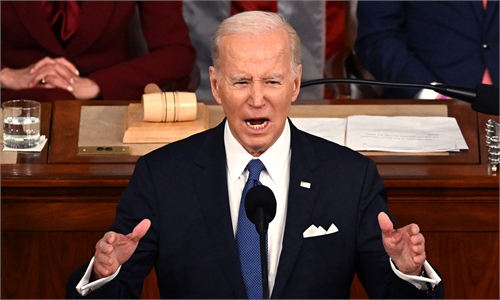Washington's sincerity 'in question' for improving China ties amid report about new Chinese envoy
Resumption of high-level engagement indicates China's responsible attitude in contrast to US' misjudgment: experts

The Chinese Vice Foreign Minister Xie Feng Photo: Chinese Foreign Ministry
After US President Joe Biden hinted at a "thaw" in the frosty US-China relations, US-based media outlet Politico reported that China's new ambassador to the US, Xie Feng, will arrive in Washington as early as Tuesday to take up his post, although it has not been confirmed by China's Ministry of Foreign Affairs as of press time on Tuesday.
Some US media and analysts who closely follow US-China relations consider that Xie's arrival is a positive sign amid a tense bilateral relationship, as it was also the longest vacancy of Chinese ambassador to the US in four decades. But Chinese experts are more guarded. Any improvement in relations depends on whether Washington is sincere in wanting to correct its wrong deeds and stop provoking Beijing on its core interests, some experts said.
Xie Feng, the Chinese Vice Foreign Minister, will arrive in Washington "as early as Tuesday." He succeeds former ambassador Qin Gang who left Washington in January to become China's foreign minister. Politico noted on Monday that Xie's arrival comes as US-China relations have sunk to a 50-year low over tensions linked to trade, Taiwan and the Chinese balloon incident in February.
Asked whether the Chinese Foreign Ministry could confirm Xie's arrival and whether it signals an improvement in US-China relations, Mao Ning, the ministry's spokesperson, said at a press conference on Tuesday that China values China-US relations. Concerning the new Chinese ambassador, she suggested reporters should follow updates on the ministry's website.
"If the information about Xie is true, it would show that China has always dealt with China-US relations in a responsible way, and hopes to manage differences and stabilize bilateral ties," Diao Daming, an associate professor at the Renmin University of China in Beijing, told the Global Times on Tuesday.
Known as a specialist on China-US relations, Xie has vast experience in handling US-related affairs. From 1993 to 2014, Xie has been engaged in diplomatic work concerning the US, switching positions between the Department of North America and Oceanian Affairs of the ministry and the Chinese Embassy in the US.
In recent weeks, Xie has met a number of US business representatives including Steven Croley, chief policy officer of Ford Motor Company, Stephen Schwarzman, chairman and CEO of Blackstone, and Stephen Orlins, president of the National Committee on US-China Relations (NCUSCR), exchanging views on China-US relations and other issues of mutual interest and concern, according to the Chinese Foreign Ministry.
In February, Xie, representing the Chinese government, lodged a solemn representation to the US Embassy in China over the US attack on a Chinese civilian unmanned airship by force
There has been a resumption of high-level engagement between China and the US lately. The meeting between China's top diplomat Wang Yi and US National Security Advisor Jake Sullivan in Vienna in early May is believed to have opened a window for the two countries to remove obstacles and ease tensions amid a diplomatic stalemate after the balloon incident. Chinese commerce minister Wang Wentao is also scheduled to travel to the US and meet his US counterpart this week.
Some US media reported recently that the Pentagon is seeking a meeting between the US Defense Secretary Lloyd Austin and Chinese Defense Minister Li Shangfu in Singapore in June.
Although more frequent high-level re-engagement between the two countries will help prevent bilateral relations from further spiraling downward, some Chinese experts said they are not optimistic on any significant progress in the China-US relations given that the Biden administration's basic strategic judgment about China remains unchanged.
If Washington really wants to see a "thaw" in US-China relations, it should stop provoking China on the Taiwan question, remove unilateral tariffs on Chinese products, lift sanctions on Chinese institutions, and reduce obstacles for people-to-people exchanges, Wu Xinbo, director of the Center for American Studies at Fudan University, told the Global Times on Tuesday.
"If the US only comes up with empty words, seeking to gain benefits from trade relations with China while continuing to contain us, it would be pointless for improving ties," Wu said.
On Monday, the US State Department walked back Biden's latest remarks about US-China relations that hinted at lifting sanctions on the Chinese defense minister. Matthew Miller, spokesperson of the State Department, said during a press briefing that the US government is not considering lifting sanctions on the Chinese official Li Shangfu.
If the US has enough sincerity to improve China relations, it should first establish a correct understanding about China, stop forming small cliques and stop hyping "China threat," Diao noted. "Washington should not say one thing and do another, and we need carefully observe its deeds while listening to its words," the expert said.


